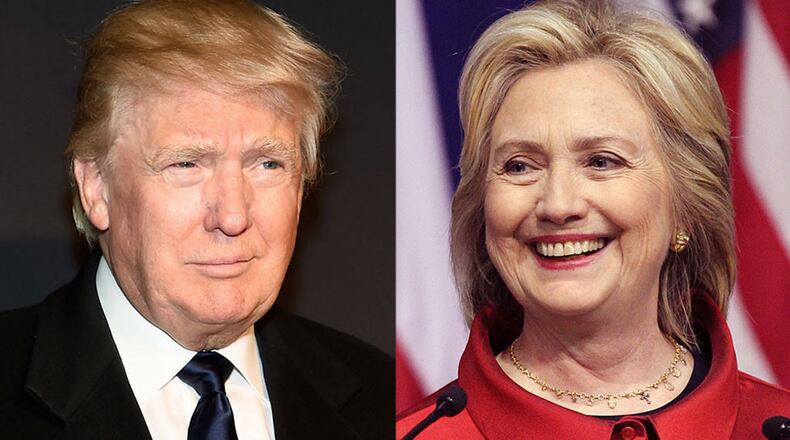Republican Donald Trump and Democrat Hillary Clinton pulled closer to clinching their parties' nomination with big victories in the five East Coast states that held votes Tuesday, seizing the chance to pile up delegates before the race turns to more challenging terrain in May.
Trump added Connecticut, Delaware, Maryland, Pennsylvania and Rhode Island to his haul of wins, further distancing himself from his two rivals with dominating victories across the Northeast. Clinton scored wins in Connecticut, Delaware, Maryland and Pennsylvania as she expanded her lead over Vermont Sen. Bernie Sanders, who salvaged a victory in Rhode Island.
"This was to me our biggest night because it shows such diversity," Trump said in a victory speech in New York, adding: "I consider myself the presumptive nominee."
Their rivals vowed to dig in. Sanders was in West Virginia, which holds a May 10 vote, where an enthusiastic crowd of thousands cheered him. And Texas Sen. Ted Cruz and Ohio Gov. John Kasich forged a shaky alliance that has already showed signs of strain, with Kasich agreeing to abandon Indiana’s May 3 vote while Cruz said he’ll cede Oregon and New Mexico.
But their time is running out. After Tuesday, each party has only 10 states left, with California looming as the biggest prize in June. And Trump, who had the chance to add more than 100 delegates, pulled closer to the 1,237 delegates he needs to secure the GOP nod.
Clinton, meanwhile, hoped Tuesday's results allowed her to effectively declare the Democratic race for president over. With a solid lead in pledged delegates, and an enormous advantage in superdelegates, Sanders' path to the nomination is getting increasingly narrow. He'll need to win more than 60 percent of the remaining contests to surpass Clinton.
Pennsylvania was the biggest prize of the night, with 189 Democratic delegates and 71 GOP spots up for grabs. Yet despite Trump's decisive win there, he could still be tripped up by the state's byzantine rules for awarding Republican delegates. Only 17 are bound to the winner on the first ballot in Cleveland, while the rest are elected individually by voters on the ballot. And Cruz hopes to repeat his success in in Georgia and elsewhere by stacking the slate with his loyalists.
Clinton won by hefty margins in Maryland and Pennsylvania, states with diverse electorates that have long favored her campaign. Sanders avoided a clean sweep with a victory in Rhode Island, a liberal and mostly white New England outpost, but it offered him only a handful of delegates.
In her victory speech, Clinton seemed ready to pivot to the general election by showering praise on Sanders and heaping not-so-subtle attacks on the GOP leader.
"Love trumps hate," she said.
Even before the polls closed, Cruz blamed media attention for Trump's success – and said he'd be ready to compete in Indiana, Nebraska, Montana and the other sweep of states in the Midwest and West preparing to vote.
"The media has told us the candidates in this race, the Republican and the Democrat, are both going to be New York liberals," he said at a campaign stop in Knightstown, Indiana. "But I've got news for you: Tonight this campaign moves back to more favorable terrain."
About the Author
The Latest
Featured




